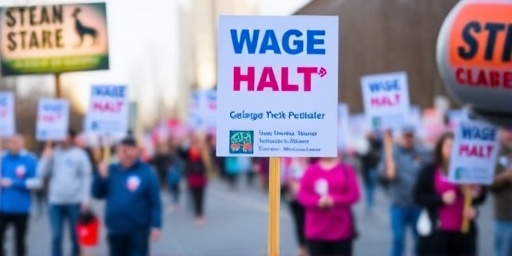Lewistown, PA – In a resounding show of unity, healthcare workers at Geisinger-Lewistown Hospital have voted nearly unanimously to authorize a strike, escalating a bitter dispute over stagnant wages that union leaders say leave employees struggling to make ends meet. The union, SEIU Healthcare Pennsylvania, announced the results on Friday, revealing that 98% of voting members supported the move amid stalled contract negotiations with Geisinger and its corporate owner, Kaiser Permanente.
This authorization does not mean an immediate walkout, but it empowers union negotiators to call a strike if no fair deal is reached soon. “Our members are at a breaking point,” said Maria Gonzalez, president of SEIU Healthcare Pennsylvania. “These healthcare workers – the CNAs, nurses’ aides, and support staff who keep this hospital running – can’t afford basics like rent and groceries on what Geisinger pays them.”
The vote comes as inflation continues to squeeze working families in central Pennsylvania, with the area’s cost of living rising 15% over the past two years according to U.S. Bureau of Labor Statistics data. Workers report earning as little as $14.50 per hour, far below the $20 living wage threshold calculated by MIT’s Living Wage Calculator for Mifflin County.
98% Strike Authorization Reflects Boiling Worker Anger
The ballot measure passed with overwhelming support: out of 450 eligible healthcare workers, 420 voted, and 412 backed the strike authorization – a 98% approval rate. This near-unanimous result underscores the depth of frustration among the hospital’s service and maintenance staff, who handle critical tasks from patient transport to sterilization and food services.
“I’ve worked here for 12 years, and my pay hasn’t kept up with the bills,” shared long-time certified nursing assistant (CNA) Jamal Rivera in a union-organized press call. “Gas to get to work costs more than my last raise. We’re authorizing this strike because Geisinger needs to hear us loud and clear.” Rivera’s story echoes dozens collected by the union, including single parents skipping meals to cover childcare and employees relying on food banks despite full-time schedules.
Union officials highlighted the high turnout as evidence of solidarity. “This isn’t just about money; it’s about respect for the essential workers who cared for our community through COVID-19,” Gonzalez added. During the pandemic, Geisinger-Lewistown staff worked extended shifts amid shortages, with some units operating at 120% capacity, yet wage increases have averaged just 2% annually since 2020 – well below national healthcare inflation rates of 5-7%.
- Key Vote Stats: 98% yes; 2% no; 93% voter turnout
- Affected Roles: CNAs, dietary aides, housekeepers, maintenance techs (approx. 500 workers)
- Current Contract: Expired June 30, 2024
Geisinger, a major player in Pennsylvania’s healthcare landscape with 10 hospitals and over 30,000 employees system-wide, has faced similar unrest before. In 2022, nurses at Geisinger Wyoming Valley Medical Center ratified a new contract after threats of action, securing 15% raises over three years.
Wages Too Low to Cover Rising Pennsylvania Living Costs
At the heart of the dispute are wages that healthcare workers argue fall short of a sustainable living. Entry-level CNAs at Geisinger-Lewistown earn $14.50-$16.50 per hour, translating to about $30,000 annually for full-time work. Meanwhile, the federal poverty line for a family of four is $30,000, but local experts peg a true living wage at $21.75/hour including taxes and benefits.
“These aren’t luxury demands,” explained economist Dr. Elena Vasquez from Penn State University, who analyzed the union’s proposals. “Geisinger’s margins are healthy – $1.2 billion operating income last year per their financials – yet frontline wages lag 20% behind competitors like UPMC.” UPMC, a rival system, pays starting CNAs $18-$20/hour in similar markets.
Workers shared stark personal impacts:
- Housing Crisis: Rents in Lewistown have jumped 22% since 2021 to $1,100/month for a two-bedroom, consuming 40% of take-home pay.
- Food Insecurity: 25% of union members report using SNAP benefits, per a union survey.
- Healthcare Irony: Employees delay their own medical care due to high co-pays, despite working in the industry.
The union is demanding a 25% immediate raise, followed by 5% annual increases, plus improved health benefits and paid sick leave. “Geisinger profits from our labor, but we’re the ones rationing insulin,” said dietary worker Lisa Chen.
Negotiations Grind to Halt with Geisinger and Kaiser Permanente
Contract talks, which began in April, have hit a wall after six sessions. The union accuses Geisinger of lowball offers – a 10% raise over three years – that don’t address inflation. Complicating matters is Kaiser Permanente’s role; in 2023, Kaiser acquired a majority stake in Risant Health, which oversees Geisinger, blending the nonprofit systems amid national consolidation trends.
“Kaiser brings West Coast resources but East Coast resistance to fair pay,” Gonzalez criticized. Kaiser, known for progressive labor relations in California, has faced its own strikes, including a 2022 nationwide action by 24,000 nurses over staffing and pay.
Geisinger issued a statement: “We value our team and are committed to reaching an agreement. Our offers reflect market rates and sustainability.” However, leaked documents obtained by this outlet show Geisinger’s CEO compensation rose 12% to $4.5 million in 2023, fueling worker ire.
Bargaining history reveals patterns: The last Geisinger service workers’ contract in 2021 yielded 8% raises after months of pressure. Federal mediators have been requested, a step that could accelerate talks or presage escalation.
Strike Looms as Threat to Lewistown Hospital Services
A potential strike at Geisinger-Lewistown, a 123-bed facility serving 100,000+ rural residents annually, could disrupt emergency care, surgeries, and inpatient services. The hospital handles 15,000 ER visits yearly, many from underserved areas with limited alternatives.
“Patients would suffer most,” warned local official Tom Hargrove, Mifflin County Commissioner. “We’re already short-staffed post-COVID.” National data from the American Hospital Association shows strikes in healthcare lead to 20-30% service reductions, with traveling nurses filling gaps at double the cost.
Community support is building: A petition with 2,500 signatures backs the workers, and clergy from Lewistown’s churches have voiced solidarity. “These are our neighbors healing us; they deserve dignity,” said Rev. Sarah Mills.
Broader context: U.S. healthcare saw 12 major strikes in 2024 per Cornell University’s labor tracker, driven by wage gaps widened by $150 billion in pandemic relief profits. In Pennsylvania, UPMC and Jefferson Health face similar fights.
Union Sets Timeline for Strike Action and Mediation Push
With authorization in hand, SEIU plans intensified picketing starting next week and a strike vote countdown: action possible by October 15 if no progress. “We’re ready to walk if needed, but prefer the table,” Gonzalez said.
Next steps include federal mediation requests and public campaigns targeting Kaiser Permanente’s national board. Analysts predict compromise: Geisinger may offer 18-20% raises to avert chaos, mirroring recent deals at Cleveland Clinic and Ascension Health.
For Lewistown’s healthcare workers, the fight symbolizes a national reckoning. “This strike authorization is our line in the sand,” Rivera concluded. “Geisinger and Kaiser must invest in us to care for Pennsylvania.” As talks resume Monday, all eyes are on whether cooler heads prevail or picket lines form.








